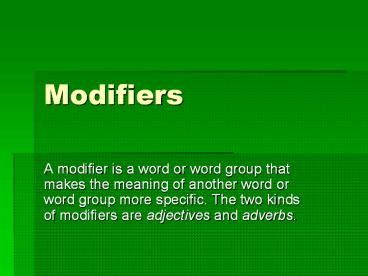Modifiers PowerPoint PPT Presentation
1 / 17
Title: Modifiers
1
Modifiers
- A modifier is a word or word group that makes the
meaning of another word or word group more
specific. The two kinds of modifiers are
adjectives and adverbs.
2
Adjectives
- Modify nouns or pronouns
- Which one? The lonely cat wandered around.
- What kind? The American flag is flying high.
- How many? She wears three rings on her left hand.
3
Adverbs
- Can modify verbs, adverbs, and adjectives
- How? The car goes fast.
- When? We will go tomorrow.
- Where? The book is there.
- To What Extent? She is very unhappy.
4
Bad and Badly
- Bad is an adjective. In most uses, badly is an
adverb. - The dog was bad.
- The dog behaved badly.
- Remember that a word that modifies the subject
of a verb should be in adjective form. - NONSTANDARD The stew tasted badly.
- STANDARD The stew tasted bad.
5
Good and Well
- Good is an adjective. It should not be used to
modify a verb. - Well may be used either as an adjective or as an
adverb. As an adjective, well has two meanings
in good health and satisfactory.
6
Good and Well
- NONSTANDARD He speaks Italian good.
- STANDARD He speaks Italian well.
- STANDARD His Italian sounds good. (Good is an
adjective that modified the noun Italian.)
7
- John is well. (John is in good health.)
- All is well. (All is satisfactory.)
- They did well in the tryouts.
8
Slow and Slowly
- Slow is used as both an adjective and an adverb.
Slowly is an adverb. In most adverb uses, it is
better to use slowly than to use slow. - We took a slow drive through the countryside.
(modifies drive) - The train slowly came to a stop. (modifies how
the train stopped)
9
Real and Really
- Real is an adjective meaning actual or
genuine. Really is an adverb meaning actually
or Truly. Although real is commonly used as an
adverb meaning very in everyday situations,
avoid using it in formal speaking and writing. - Formal He batted really well in the game.
- Informal He batted real well in the game.
10
Correct? (textbook pg. 576)
- You have done very good today, Marcia.
- The nurse shark was moving very slow over the
seabed. - The fireworks exploded with a real loud bang.
- The team did not play badly, but they lost
anyway. - James thinks that Jakob Dylan is a well singer.
- The box was not damaged too bad when it fell.
- The turtle is very slowly on land, but it is much
faster underwater. - Is that really Sammy Sosas autograph?
- Even if your day is going bad, getting angry at
me will not help. - Slowly but surely, the fawn improved until it
could run real good.
11
Comparisons
- Positive good young fearful
- Comparative better younger more fearful
- Superlative best youngest most fearful
12
Write the comparative and superlative forms of
the following words.
- Fast
- Happy
- Simple
- Safe
- Calm
- Soon
- Careful
- Hazy
- Wisely
- Pretty
13
- Positive helpful
- Comparative less helpful
- Superlative least helpful
14
Irregular Comparisons
- Positive bad good/well many/much
- Comparative worse better more
- Superlative worst best most
15
Misplaced modifiers
- Misplaced modifiers are modifiers that are
positioned so that they appear to modify the
wrong thing. - In general, you should place single-word
modifiers near the word or words they modify,
especially when a reader might think that they
modify something different in the sentence.
Consider the following sentence - WRONG After our conversation lessons, we could
understand the Spanish spoken by our visitors
from Madrid easily. - Do we understand the Spanish easily, or do the
visitors speak it easily? This revision
eliminates the confusion - RIGHT We could easily understand the Spanish
spoken by our visitors from Madrid.
16
Dangling Modifiers
- The dangling modifier is often (though not
always) located at the beginning of a sentence. A
dangling modifier is usually a phrase that
functions as an adjective but does not modify any
specific word in the sentence, or (worse)
modifies the wrong word. Consider the following
example - Raised in Nova Scotia, it is natural to miss the
smell of the sea.
17
- The introductory phrase in the above sentence
looks as if it is meant to modify a person or
persons, but no one is mentioned in the sentence.
Such introductory adjective phrases, because of
their position, automatically modify the first
noun or pronoun that follows the phrase -- in
this case, "it." The connection in this case is
illogical because "it" was not raised in Nova
Scotia. You could revise the sentence in a number
of ways - For a person raised in Nova Scotia, it is natural
to miss the smell of the sea. (the phrase no
longer functions as an adjective) - Raised in Nova Scotia, I often miss the smell of
the sea. (the phrase functions as an adjective
but now automatically modifies "I," a logical
connection)

